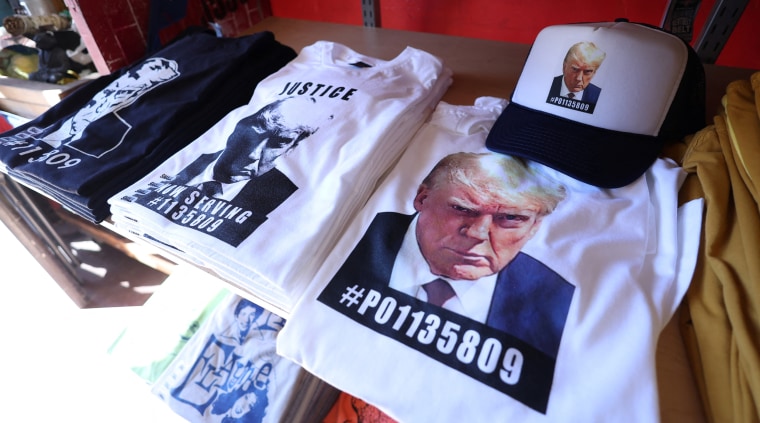Donald Trump surrendered to authorities in Georgia last week and had his mug shot taken by the Fulton County sheriff. He wasted no time in turning that photo into a massive moneymaker. You name it, the Trump campaign slapped his mug shot on it: a $34 mug shot T-shirt, a “Never Surrender” coffee mug for $25, beverage coolers at $15 for a pair — and much, much more.
While there has been no official report on how much the sale of these items has brought in, Politico reported last week that the campaign had raised north of $7 million since the mug shot’s release, “powered” by the sales of merchandise “bearing Trump’s scowling mugshot.”
But as various legal experts have noted, Trump’s sale of that mug shot, taken by the Fulton County sheriff, may violate U.S. copyright laws. This could mean that theoretically, the millions he is making off that photo may rightfully belong to the Fulton County sheriff — an entity that just happens to be in desperate need of funds to address the horrific conditions in the Fulton County Jail.
Theoretically, the millions he is making off that photo may rightfully belong to the Fulton County sheriff.
As a general principle, the owner of a photo’s copyright is the person (or entity) who takes that photo, not its subject. In federal criminal cases, the U.S. government is not permitted to own the copyright to booking photos, so they are considered in the public domain. However, that is generally not the case with mug shots taken in state and local criminal proceedings.
Betsy Rosenblatt, a professor at Case Western Reserve University School of Law, recently explained to Spectrum News 1 Ohio that the copyright owner of Trump’s mug shot is likely the Fulton County Sheriff’s Office. Other legal experts support that interpretation, including a 2022 article in the University of Georgia School of Law’s Journal of Intellectual Property Law that noted, “In the context of photographs taken by law enforcement during the booking process, the author of the mugshot photograph is the law enforcement agency.”
That would, again theoretically mean the Fulton County Sheriff’s Office has exclusive rights under U.S. copyright law to reproduce, sell or otherwise distribute Trump’s mug shot, except for certain uses like publishing the photo for news purposes. (I emailed the Fulton County Sheriff’s Office on Wednesday to confirm it owns the copyright and to ask if the Trump campaign has permission to use the image to sell for a profit. I have not received a response.)
It’s true the Fulton County Sheriff’s Office did release the mug shot, but that doesn’t necessarily mean anyone else has the right to reproduce and sell it for a profit, as the Trump campaign is doing.
In fact, the Trump campaign itself clearly understands the photo’s commercial value, as evidenced by its recent threat to come after anyone else who wants to use the image to make a profit. Chris LaCivita, one of Trump’s top advisers, made that clear in a post on X (formerly Twitter) that said: "If you are a campaign, PAC , scammer and you try raising money off the mugshot of @realDonaldTrump and you have not received prior permission ...WE ARE COMING AFTER YOU you will NOT SCAM DONORS".
Trump could pursue such a claim, not based in copyright law, however, but because he has the right to control the use of his image for commercial purposes. But again, that is in no way a defense for Trump and his campaign’s apparent violation of copyright law.
There's also the copyright precedent of the famous “Hope” poster for then-candidate Barack Obama, which was created by artist Shepard Fairey. Fairey had used a photograph of Obama taken by The Associated Press, to which Fairey added the red, white and blue coloring, together with the word “hope.”
The AP alleged that Fairey had generated $400,000 in sales from buttons, shirts and other items that featured that image. In a preemptive lawsuit, Fairey claimed he had transformed the image with his changes, an instance of fair use that didn't infringe on the AP's copyright.
In the end, after two years of litigation, the two sides settled, agreeing “to work together going forward with the Hope image and share the rights to make the posters and merchandise bearing the Hope image.” The bottom line was that Fairey could no longer sell the items and pocket the proceeds.
Unlike with Fairey, Trump has made no effort to “transform” the image into something different. His campaign just took the photo and slapped it on some merch. And because Trump’s campaign is profiting off the sale of the mug shot, that would undermine any fair use defense. (Obviously, none of the other people who might be capitalizing on Trump’s mug shot have any more claim to it than he does. But the volume of his operation and his public prominence put him in a separate category.)
What happens now? As Rosenblatt noted, the sheriff office's decision "to enforce its copyright is entirely up to them.”
To be clear, this seems very unlikely. But if it did, the damages to which it could be entitled under U.S. copyright law, while not criminal, could still be very costly for Team Trump. Specifically, all the money that the Trump campaign made from selling the mug shot.
Recently, Fulton County Sheriff Patrick Labat pleaded with county commissioners for funding he desperately needs to address conditions in the county jail, according to local station 11 Alive. LaBat told the commissioners, “It’s a human crisis, and I have been begging for the resources,” adding, “I’m really, really tired of begging for money to do my job.”
If LaBat brings a claim of copyright infringement against Trump’s campaign and wins, he could see millions of dollars come his agency’s way to address those issues. That would at least be a just result.

